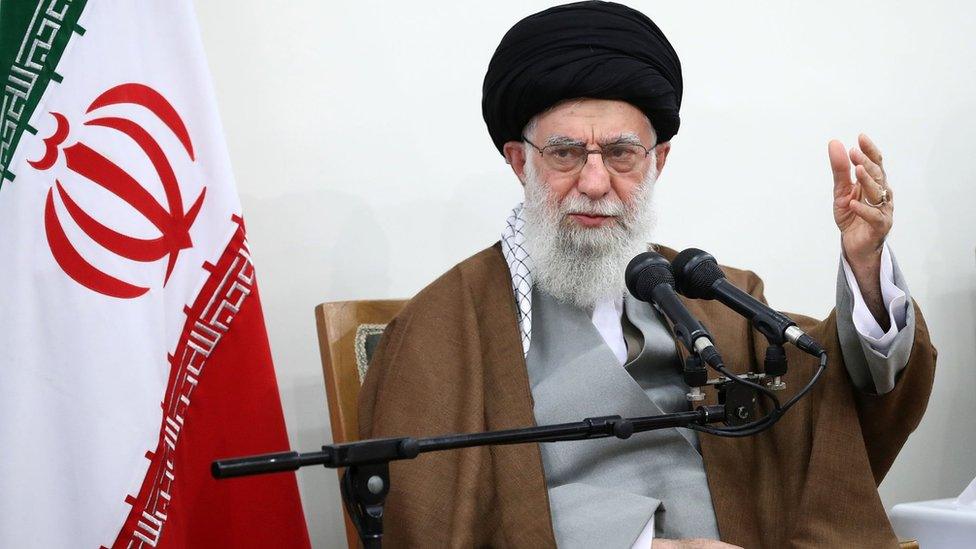By Ryan Prosser
Daily Mail
Oct 19, 2024

The IDF has blown up a Hezbollah tunnel network in the southern Lebanese town of Mhaibib
This is the dramatic moment IDF forces blew up a Hezbollah tunnel using hundreds of tons of explosives.
Israel said it had dismantled a tunnel network used by the group's elite Radwan Forces in the Lebanese town of Mhaibib.
A
video shared by the IDF showed multiple explosions in the small hilltop
town near the border, destroying a cluster of buildings in a huge cloud
smoke.
On Wednesday, struck dozens of Hezbollah targets in the Nabatieh area in south Lebanon.
The strike on Mhaibib destroyed over 50 shafts located in mosques, schools and other civilian buildings, according to the Mako news website.
Hundreds of explosives were used to dismantle the tunnels and over 50 shafts in civilian buildings
Dramatic footage showed the moment explosives were detonated, destroying a cluster of buildings
The hilltop town of Mhaibib, located near the Israeli border, before the explosion
Weapons found in the extensive tunnels,
from where Hezbollah allegedly planned an attack on Galilee, included
anti-tank missiles, machine guns, RPG launchers and Kalashnikov rifles.
It
comes as the largest Israeli air strike on a Lebanese state building
killed 16 people including the mayor of Nabatieh Ahmed Kahil.
Over 50 people were also left injured in the regional capital, according to Lebanese officials.
Israel
first issued an evacuation order for the city, home to tens of
thousands of people, on October 3, but Mr Kahil said he wouldn't leave.
The
nation's caretaker Prime Minister Najib Mikati said that Israeli forces
had 'intentionally targeted' a municipal council meeting to aid people
displaced by the IDF campaign.
Matthew
Miller, a spokesperson for Israel's state department, said: 'Obviously,
we'd not want to see entire villages destroyed. We don't want to see
civilian homes destroyed.'
Israeli
operations in Lebanon have killed at least 2,350 people over the last
year, according to the health ministry, and more than 1.2 million people
have been displaced. The death toll does not distinguish between
civilians and combatants but includes hundreds of women and children.
Around 50 Israelis, both soldiers and civilians, have been killed in the same period, according to Israel.
European Union commissioner for crisis
management, Janez Lenarcic, said Israel's 'brutal response' to the Hamas
attack that started the war had resulted in a devastating humanitarian crisis in Gaza that was now spreading to Lebanon.
He
said: 'Humanitarian workers have been targeted and killed, hundreds of
them. There is no security and safety for humanitarian work to be
organized in satisfactory manner.'
The diplomat further described the provision of humanitarian supplies as 'grossly insufficient'.
Earlier this week prime minister Benjamin Netanyahu's home was targeted by a drone.
The
government confirmed there were no injuries and neither the Israeli
leader nor his wife were home at their holiday house in Caesarea.
Netanyahu insisted that the attempted plot would not deter him and that Israel would 'win this war'.
The
drone attack was not immediately claimed by Iran-backed Hezbollah,
which has been trading fire with Israel since last October, or any other
militant group.
Just days earlier, Israel killed the Hamas leader and mastermind of the October 7 attacks Yahya Sinwar.
The
61-year-old - dubbed the Butcher of Khan Younis - was finally taken out
after an hour-long firefight of trainee soldiers on a routine operation
in the Rafah area of the Gaza Strip.
Iranian Supreme Leader Ayatollah Ali Khamenei said Sinwar's death would not halt the 'Axis of Resistance' and that Hamas would live on.
The
strike sent shockwaves across the region - with Iran's Supreme Leader
Ayatollah Ali Khamenei declaring: 'Hamas is alive and will remain
alive.'
He said the Sinwar's death would not halt the 'Axis of Resistance' and that Hamas would live on.
Built
up with years of Iranian support, the 'Axis of Resistance' includes
Hamas, the Lebanese Hezbollah group, the Houthi rebel movement in Yemen,
and various Shi'ite groups in Iraq and Syria.
Last
night Sir Keir Starmer said that 'no-one should mourn' Sinwar's death,
adding that the moment offered an 'opportunity' to step up ceasefire
talks that have so far failed to produce a breakthrough.
On
Sinwar, the Prime Minister said: 'On his hands is the blood of innocent
Israelis killed on October 7 and over the years of terror, and also the
blood of Palestinian people who suffered in the chaos and violence that
he sought and celebrated.
'Allies will keep working together to de-escalate across the region because we know there is no military-only solution.'
Sinwar
was found with electric cable tied in a makeshift tourniquet around his
arm, which was wounded by shrapnel from a small missile or tank shell.
As he had been imprisoned in Israel for 22 years, hs genetic information was kept on file, allowing him to be identified.
Meanwhile the UN mission in Lebanon (UNIFIL) said its peacekeepers observed an Israeli tank firing at their watchtower near southern Lebanese town Kfar Kela on Wednesday morning. It said two cameras were destroyed and the tower was damaged in the attack.
Israel
denied it targeted UNIFIL sites and said it would 'thoroughly examine'
every incident, while adding that Hezbollah had been operating from
sites built adjacent to many UNIFIL posts 'for many years'.
Israel
has previously called on the United Nations to move members of the
UNIFIL peacekeeping force in southern Lebanon out of the combat zone for
their safety.
On a visit to northern
Israel near the border, defence minister Yoav Gallant insisted Israel
would not halt its assault on Hezbollah to allow negotiations.
'We
will hold negotiations only under fire. I said this on day one, I said
it in Gaza and I am saying it here', he said in a statement.






No comments:
Post a Comment